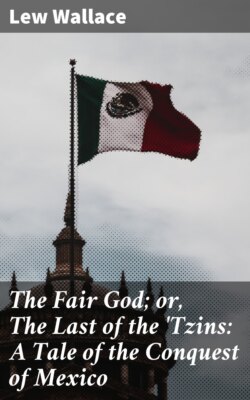Читать книгу The Fair God; or, The Last of the 'Tzins: A Tale of the Conquest of Mexico - Lew Wallace - Страница 15
На сайте Литреса книга снята с продажи.
Оглавление“And the broad-shouldered fellow now fixing the thong of his shield?”
“The Otompan—a good warrior. They say he goes to battle with the will a girl goes to a feast. The other is the Cholulan; he has his renown to win, and is too young.”
“But he may have other qualities,” suggested Hualpa. “I have heard it said that, in a battle of arrows, a quick eye is better than a strong arm.”
The broker yawned. “Well, I like not those Cholulans. They are proud; they scorn the other nations, even the Aztecs. Probably it is well they are better priests than soldiers. Under the red canopy yonder I see his father.”
“Listen, good Xoli. I hear the people talking about the ’tzin? Where can he be?”
Just then within the wall of shields there came a warrior, who strode swiftly toward the solitary gage. His array was less splendid than his comrades’; his helm was of plain leather without ornament; his escaupil was secured by a simple loop: yet the people knew him, and shouted; and when he took down the plain shield and fixed it to his arm, the approbation of the common soldiery arose like a storm. As they bore such shields to battle, he became, as it were, their peculiar representative. It was Guatamozin.
And under the royal canopy there was rapid exchange of whispers and looks; every mind reverted to the paper dropped so mysteriously into the king’s hand at the palace door; and some there were, acuter than the rest, who saw corroboration of the meaning given the writing in the fact that the shield the ’tzin now chose was without the owl, his usual device. Whether the monarch himself was one of them might not be said; his face was as impassive as bronze.
Next, the Othmies and Tlascalans, dignified into common challengers of the proudest chiefs of Tenochtitlan, were conducted into the arena.
The Tlascalans were strong men used to battle; and though, like their companions in danger, at first bewildered by the sudden introduction to so vast a multitude, they became quickly inured to the situation. Of the Othmies, a more promising pair of gladiators never exhibited before a Roman audience. The father was past the prime of life, but erect, broad-shouldered, and of unusual dignity; the son was slighter, and not so tall, but his limbs were round and beautiful, and he looked as if he might outleap an antelope. The people were delighted, and cheered the challengers with scarcely less heartiness than their own champions. Still, the younger Othmi appeared hesitant, and, when the clamor somewhat abated, the sire touched him, and said—
“Does my boy dream? What voice is in his ear that his heart is so melted? Awake! the shield is on the arm of the foe.”
The young man aroused. “I saw the sun on the green hills of Othmi. But see!” he said, proudly, and with flashing eyes, “there is no weakness in the dreamer’s arm.” And with the words, he seized a bow at his feet, fitted an arrow upon the cord, and, drawing full to the head, sent it cleaving the sunshine far above them. Every eye followed its flight but his own. “The arm, O chief, is not stronger than the heart,” he added, carelessly dropping the bow.
The old warrior gazed at him tenderly; but as that was no time for the indulgence of affection, he turned to the Tlascalans, and said, “We must be ready: let us arm.”
Each donned a leathern helm, and wrapped himself in a quilted escaupil; each buckled the shield on his arm, and tightened the thongs of his sandals. Their arms lay at hand.
Such were the preparations for the combat, such the combatants. And as the foemen faced each other, awaiting the signal for the mortal strife, I fancy no Christian has seen anything more beautiful than the theatre. Among the faces the gaze swam as in a sea; the gleaming of arms and ornaments was bewildering; while the diversity of colors in the costumes of the vast audience was without comparison. With the exception of the arena, the royal platform was the cynosure. Behind the king, with a shield faced with silver, stood Maxtla, vigilant against treachery or despair. The array of nobles about the couch was imperial; and what with them, and the dark-eyed beauties of his household, and the canopy tingeing the air and softly undulating above him, and the mighty congregation of subjects at his feet, it was with Montezuma like a revival of the glory of the Hystaspes. Yet the presence of his power but increased his gloom; in a short time he heard no music and saw no splendor; everything reminded him of the last picture on the western wall of the golden chamber.
